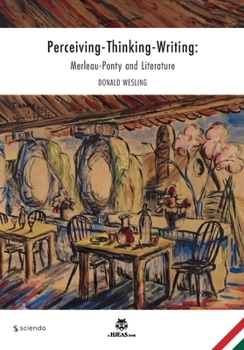Perceiving-Thinking-Writing: Merleau-Ponty and Literature
Donald Wesling's leading argument, drawn from a crossover theory of the humanities, has philosophy and literature in a relation of constructive interference. What is common to both disciplines is the attempt to understand the necessary but often forgotten act of perceiving within the embodied mind. Wesling asks and answers: How does perceptual content enter thinking and writing?His topics include a redefinition of Maurice Merleau-Ponty's phenomenology as a big-hearted rationality; quantum interference as a metaphor for thinking and also for the relation of self to the outer surround of things and persons; nine key terms from Merleau-Ponty as applied to the practical reading of poems and stories; the role of the sentence as an energy that structures thinking and writing; ordinary creativity and co-creativity.Overall, Wesling emphasizes that the meaning for the humanities, now, may be found in Merleau-Ponty's belief that future work will be a search for "a secondary, laborious, rediscovered na vet " and that in this pursuit "our relation to what is true must pass through others." ABSTRACTING & INDEXING Baidu ScholarBayerische StaatsbibliothekBDSBoDBowker Book DataCiandoCNKI Scholar (China National Knowledge Infrastructure)DimensionsEBSCOExLibrisGoogle BooksGoogle ScholarNavigaReadCubeSemantic Scholar TDOne (TDNet)WorldCat (OCLC)X-MOL
Format:Paperback
Language:English
ISBN:836740596X
ISBN13:9788367405966
Release Date:May 2025
Publisher:Sciendo
Length:198 Pages
Weight:0.71 lbs.
Dimensions:0.4" x 6.7" x 9.6"
Customer Reviews
0 rating





